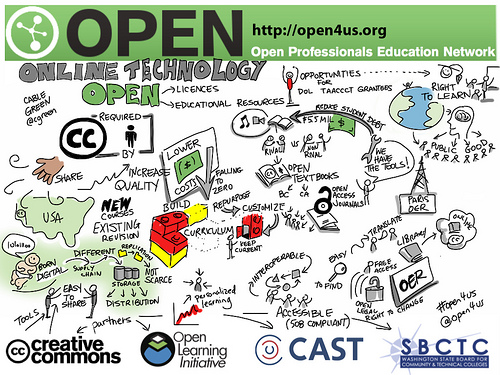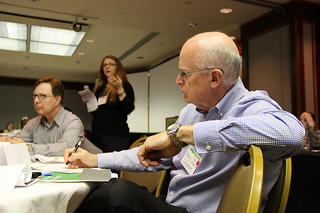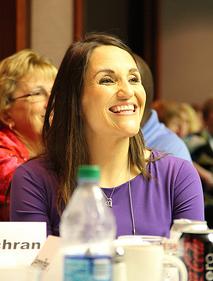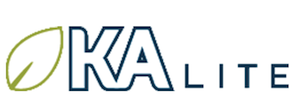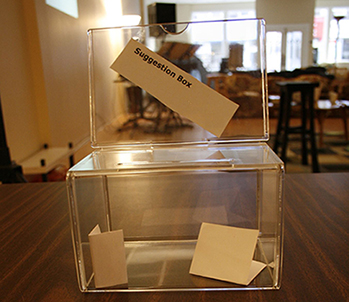OpenChem, Open Curriculum, and the Value of Openness
jeudi 27 juin 2013 à 23:52I recently spoke with Larry Cooperman, director of OpenCourseWare at the University of California, Irvine (UCI). Larry also serves on the boards of the OpenCourseWare Consortium and the African Virtual University. I asked Larry about UC Irvine’s new OpenChem project.
Why, in the middle of such excitement over MOOCs, would the Department of Chemistry and the OpenCourseWare project at the UCI unveil their CC BY-SA–licensed OpenChem project, a set of video lectures equivalent to four years of classes? Because they’ve designed OpenChem to focus on building out an extensive path to learning chemistry via an open curriculum rather than offering highly designed intensive course experiences like Coursera and EdX.
OpenChem is designed to be reused, revised, and remixed — by institutions, departments and instructors. This differs in the most fundamental way from the fixed-path, single-instructor model of most MOOCs. OpenCourseWare and MOOCs aspire to provide access to high quality, higher education learning to those unable, for a variety of reasons, to attend either an “elite” institution or any college or university at all.
For some time, Larry has been arguing that we are falling short of this vision. 80% of Coursera users are college graduates and most of the rest are advanced high school and current university students. There is no doubt that others, for lack of access to a basic internet connection, much less the bandwidth required for high-resolution video streaming, won’t share in these benefits. But there is a second reason, even more troubling than the bandwidth problem, which should concern us. The design of university-level courses, when they come from “elite” institutions, is for that audience — namely, “elite” students. Courses aren’t designed for students whose secondary institutions have left them with gaps in their education.
And that gets me back to the design of OpenChem — or openly licensed curriculum in general. If there is one thing that we can do to use open education to improve higher education, it is to allow existing colleges and universities that serve these students to improve their educational offerings through adoption and adaptation. That means that those who best know a specific cohort of students must be free to choose from easily integrated, openly licensed materials that match their curricular needs and objectives. The very first use of OpenChem occurred locally at Saddleback College, when an instructor used ten minutes of a UCI video lecture that offered an explanation of a very specific topic to use in his flipped classroom. And that’s really the point. An instructor may find ten minutes useful. A department may adopt a course that had not previously been offered. An institution may adapt an entire curriculum. Further, if the content is not exactly what an instructor wants, the open license allows her to change it to meet local needs.
MOOCs could also enable these opportunities, though they will need to make it simple for their course authors and their contributing colleges and universities to add a Creative Commons license to their course content. CC stands ready to help them do so.
Of course, chemistry is a lab science. Allowing students to virtually sit in UCI lecture halls for four years via OpenChem could never substitute for a local institution offering a complete education. By creating a full pathway from a course designed for those without adequate high school chemistry preparation to graduate electives, UCI is making its chemistry education visible. But the goal of OpenChem isn’t substitution — it is to enable both educators and students to collaborate with others. Just as UCI hopes to support science education, they also hope others will adapt and improve OpenChem courses, translate them into other languages, and distribute them far and wide.
Kenneth Janda, Dean of the School of Physical Sciences and Professor of Chemistry at UCI, invites institutions to use “a whole lecture or a series of lectures, free of charge, and without asking permission to advance your educational mission.” That’s a fairly good itemization of the key benefits of openly licensed resources versus public but read-only copyrighted resources; it is the difference between open and free.
UCI also anticipates important learner benefits that are derived from having an open curriculum, including the ability to go forwards and backwards at will. For instance, looking ahead, an advanced high school student can go past the level of AP Chemistry. An entering college freshman could study Preparation for General Chemistry to ensure their readiness. Or an enrolled student can view the typical coursework and decide whether to become a chemistry major. Just as important, a student having trouble with a class can review the prior knowledge — the building blocks that are required to succeed in their current class.
This last point is perhaps the most crucial. Openness in education is about visibility. UCI uses an entire open curriculum to let learners and instructors alike see how it all hangs together. UCI has a lot of work left to do to optimize OpenChem for learning, but is excited to point its university and other institutions in a new direction that brings us all a little closer to the goal of universal access to higher education.
